

What running does to your brain. What running does to your brain. What running does to your brain. 8 human weaknesses that threaten to wreck your wealth. This is 45: The Eye of Life's Storm. The Spider and the Secret of Happiness - Mind Problem. Healing Trauma Somatic Experiencing. Suzanne* arrives in my office due to a long history of anxiety, mild depression, problems sleeping, and relationship issues.
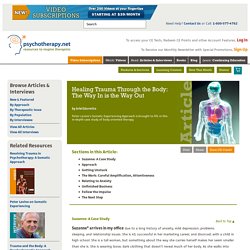
She is 43, successful in her marketing career, and divorced, with a child in high school. She is a tall woman, but something about the way she carries herself makes her seem smaller than she is. She is wearing loose, dark clothing that doesn’t reveal much of her body. Yoga for Inner Peace: 12 Poses to Release Sadness. Join Colleen Saidman Yee's half-day workshop, Yoga for Inner Peace, at Yoga Journal LIVE Florida on Saturday, Nov. 12.
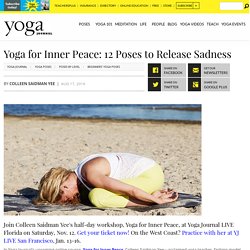
Get your ticket now! On the West Coast? Practice with her at YJ LIVE San Francisco, Jan. 13-16. In Yoga Journal's upcoming online course, Yoga for Inner Peace, Colleen Saidman Yee—acclaimed yoga teacher, fashion model, and the wife of yogi Rodney Yee—offers 3 yogic practices a week for 12 weeks to transform your body, mind, and heart and support YOU in your personal journey toward inner peace. Here, she discusses the importance of letting yourself feel sad, and demonstrates a sequence to release grief and other festering emotions. The Importance of Feeling Sad. Depression and Sex: How Depression Affects Sexual Desire. Does anyone else get depressed/anxious on low carb?
4 Ways to Deal with Insecure People. Is Your Anxiety Ruining Your Relationships? The experiences of childhood carry over into our adulthoods as an unconscious pattern of responses and reactions which elude our conscious, thinking selves.
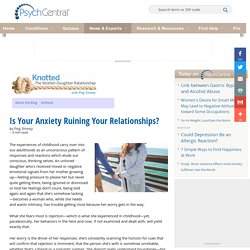
An unloved daughter who’s received mixed or negative emotional signals from her mother growing up—feeling pressure to please her but never quite getting there, being ignored or dismissed or told her feelings don’t count, being told again and again that she’s somehow lacking—becomes a woman who, while she needs and wants intimacy, has trouble getting close because her worry gets in the way. The Backfire Effect: The Psychology of Why We Have a Hard Time Changing Our Minds.
“Allow yourself the uncomfortable luxury of changing your mind,” I wrote in reflecting on the 7 most important things I learned in 7 years of Brain Pickings.
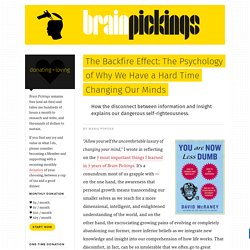
It’s a conundrum most of us grapple with — on the one hand, the awareness that personal growth means transcending our smaller selves as we reach for a more dimensional, intelligent, and enlightened understanding of the world, and on the other hand, the excruciating growing pains of evolving or completely abandoning our former, more inferior beliefs as we integrate new knowledge and insight into our comprehension of how life works. That discomfort, in fact, can be so intolerable that we often go to great lengths to disguise or deny our changing beliefs by paying less attention to information that contradicts our present convictions and more to that which confirms them.
Understanding Your Addiction: Addiction Hijacks Your Brain. You need to understand your addiction and how addiction hijacks your brain.

Addiction grabs hold of you right at your body’s information center, altering the brain in many powerful ways. Repeated exposure to substances can impact how your body reacts to everyday events, stressful situations and even the drugs or alcohol that you’ve come to crave. A brain hijacking is an apt metaphor: with addiction at the wheel, it steers you right toward the substance that will provide those euphoric feelings associated with your first high or buzz.
Here’s some information to help you better understand your addition. Understanding Addiction: Drugs Can Alter the Brain’s Reward System As humans, when we eat, have sex or fulfill any biological need, the brain releases dopamine, a neurotransmitter closely associated with feelings of pleasure. What we mean when we say “I have anxiety” – mindwanderingsword. 7 Little Ways To Help When Your Partner Has Anxiety – Never Ignore These About Health. I’m a continual raw nerve of anxiety.
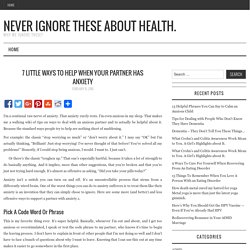
That anxiety rarely rests. I’m even anxious in my sleep. That makes me a walking wiki of tips on ways to deal with an anxious partner and to actually be helpful about it. Because the standard ways people try to help are nothing short of maddening. 10 Thinking Errors That Will Crush Your Mental Strength. Is Cognitive Dissonance Universal? Our research - Resilience: a tool to prevent or break the cycle of mood disorders - Latest findings - Research. Resilience: a tool to prevent or break the cycle of mood disorders Research leader Vijaya Manicavasagar heads up the Black Dog Institute’s Positive Psychology and Resilience program.
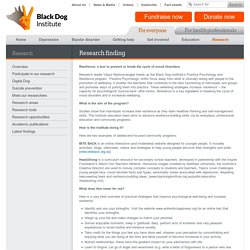
‘Positive Psychology’ shifts focus away from what is clinically wrong with people to the promotion of wellbeing. It studies the elements that contribute to the best functioning of individuals and groups and promotes ways of putting them into practice. These wellbeing strategies increase ‘resilience’ – the capacity for psychological ‘bounce-back’ after stress.
Resilience is a key ingredient in breaking the cycle of mood disorders and in increased wellbeing. What is the aim of the program? Studies show that individuals increase their resilience as they learn healthier thinking and self-management skills. How is the Institute doing it? Here are two examples of adolescent-focused community programs: Life Labs - Lydia Kimmerling. Hey I'm Lydia Kimmerling, I'm a finalist for Psychologies and Hay House's new voice for 2016.

I will be blogging here for the month of Feb and the winner is the person who has the most votes on their blogs. Will you vote for me? Support this blog by clicking "VOTE UP" above. How We Grieve: Meghan O’Rourke on the Messiness of Mourning and Learning to Live with Loss. John Updike wrote in his memoir, “Each day, we wake slightly altered, and the person we were yesterday is dead.
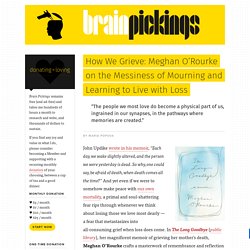
So why, one could say, be afraid of death, when death comes all the time?” When The Fog Clears. I came across one of those quotes that fly around Facebook.

It read “Some days you’ll feel sad without knowing why. Like you lost something very precious but forgot what it was, or like you miss someone you’ve never met” Whether intended or not, this is a very accurate description of my underlying feeling of having BPD, except that it is not “some days”, rather every living breathing moment. Childhood Fears All Grown Up! Do you still dread the dark or that feeling that something lies under your bed? Do you feel a particular anxiety when someone you’ve arranged to meet has not shown up at the appointed time? Does the idea of a confrontation make you feel overly anxious? If you have such feelings of dread whenever these situations (or ones like these) arise despite the logical assurances that all will be well, then it is likely that you may be re-experiencing a fear from your past.
It is not uncommon for adults to experience feelings of anxiety and apprehension over things and/or situations that are attached to traumatic and fearful experiences from childhood. In fact, it is during childhood where lasting attitudes and perceptions about things and situations are largely formed. I Am My Own Worst Bully. NOTE: This is a guest essay by inspiring author Nanea Hoffman, founder of Sweatpants and Coffee. I was scrolling through Facebook at the end of a long day when I saw the pictures. Someone in a private group I belong to for parents from our local Girl Scouts troop uploaded an album entitled “Pics From Our Humane Society Field Trip Today!” DBT for Fi by Fiona Kennedy. I'm a 30ish year old, married Mam of two gorgeous kids. I live in Galway, have good friends, and a really loving, supportive family. But, I also have borderline personailty disorder (BPD) and depression. Both can be treated to a certain extent by medication, but for BPD in particular, it's just not enough.
Kierkegaard on Our Greatest Source of Unhappiness. Childhood Emotional Neglect. 6 Steps to Confront Passive-Aggressive Behavior.